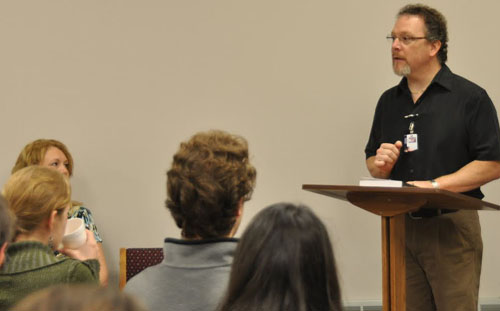In Conversation with Andrew Schmutzer, Part 2
An interview with Andrew Schmutzer about The Long Journey Home: Understanding and Ministering to the Sexually Abused, and part 2 of his chapter, “A Theology of Sexuality and its Abuse: Creation, Evil, and the Relational Ecosystem” as appearing in Pneuma Review Fall 2013.
Note from the Editors: Beginning a conversation about sexual abuse is uncomfortable, but we feel strongly that this topic is something the church needs to address. We believe the testimonies of authentic recovery can help us embrace the pain of the hurting and make openings for God to bring healing.
Pneuma Review: You wrote, “Christian theology has historically separated culture from nature and nature from theology, which unfortunately has dichotomized the temporal from eternal, material from the spiritual, and so creation from redemption.” Please give us some examples of this.
Andrew Schmutzer:

Andrew J. Schmutzer discussing The Long Journey Home in 2011, by Lulu Hé. Courtesy of Moody Bible Institute.
My point here is to inform the reader of how common dualisms are in Western theology (e.g., body vs. soul, etc.). These polarities are more anesthetizing than energizing and this has had a devastating effect on a theology of personhood (what is called anthropology). Western Christianity as a whole has emphasized a highly individualized salvation. Eschatologically separated from creation and community, salvation, as it has traditionally been taught, has scorned the physical world and with it human embodied sexuality. In practice, it has been part of Christian pietism to associate sexuality with the “world, the flesh, and the devil,”—all bound to sinful humanity. Waiting for this world to just “burn up” and a better one to begin does not welcome people to live now. An isolated salvation has resulted in an isolated life, a simplistic human being, and a simplistic view of trauma.
An emphasis on a “deeper” spirituality has been code for ignoring the complexities of embodied life, on the one hand, and declaring “victory” over suffering, on the other hand. Along with a minimization of the physical realities of life, this world view can loom so large that there is little if any basis for physical and relational consequences of sin in relationships. When grace becomes perfectionistic, the raw pain of an abused teenager can be easily dismissed with reminders that “one day we’ll all shuck this physical container, anyway.” As a survivor, I’ve heard such statements as: “Just move on to victory,” “Just submit to the Holy Spirit,” “All things are new in Christ Jesus,” and others. Making such statements to a victim—especially from a non-survivor—actually rejects their pain, informs them they can’t be frustrated with God, and ignores the embodied realities of their suffering (e.g., dissociation, panic attacks, cutting, gastro-intestinal illnesses, etc.).
Abuse tears apart the wholeness of a person. Abuse does not merely objectify a person, it coldly approaches and latches on, hobbling its victim with complex wounds. As such, sexual abuse de-personalizes because it tears out pieces of the person that are intimately connected to the larger fullness of being. This violation does not extinguish life, it deadens life along a spectrum of security and terror, respect and shame—wholeness and brokenness.
Category: Fall 2013, Ministry, Pneuma Review


